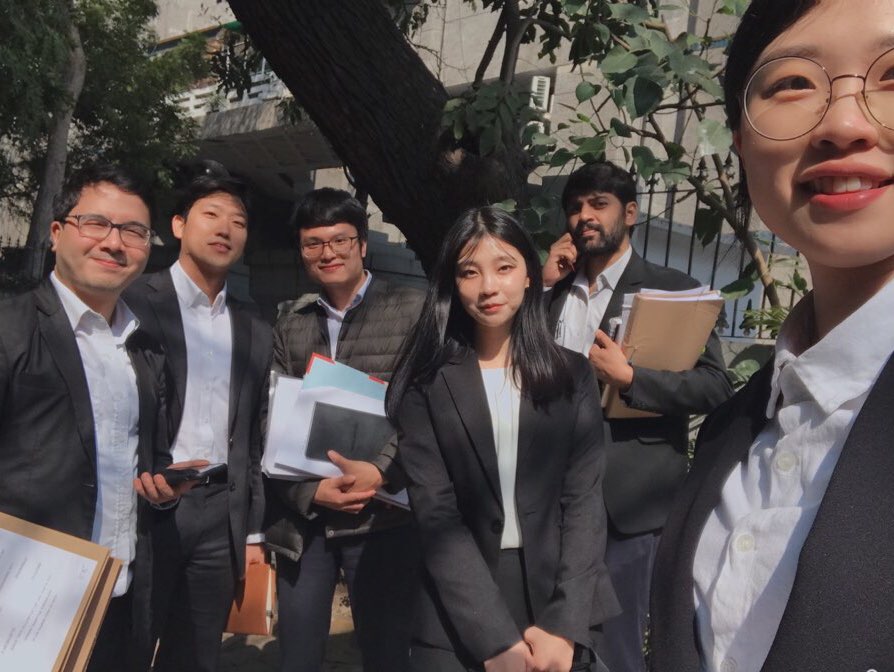Post by: Yaeeun Shin
 I had many obstacles before even setting my foot in India for internship. First, the student Internship visa took more than a month to come through with no explanation for the delay. Second, consequently I had to cancel and re-schedule the flight tickets and even after booking the ticket I had to re-book it due to the Coronavirus situation in Asia. I was very discouraged and even doubted whether I could do this internship. However, throughout this experience, I had learned many things. I got to pray more. Not only to ask God for the visa but I begun to ask God why he was letting this happen, and what he wanted me to get out of the situation. Furthermore, I had improved professional e-mail writing skills! I had to actively communicate with many channels regarding the delayed visa and internship, the professors, Regent Justice Grant authorities, travel agencies, the embassy and my India internship supervisors.
I had many obstacles before even setting my foot in India for internship. First, the student Internship visa took more than a month to come through with no explanation for the delay. Second, consequently I had to cancel and re-schedule the flight tickets and even after booking the ticket I had to re-book it due to the Coronavirus situation in Asia. I was very discouraged and even doubted whether I could do this internship. However, throughout this experience, I had learned many things. I got to pray more. Not only to ask God for the visa but I begun to ask God why he was letting this happen, and what he wanted me to get out of the situation. Furthermore, I had improved professional e-mail writing skills! I had to actively communicate with many channels regarding the delayed visa and internship, the professors, Regent Justice Grant authorities, travel agencies, the embassy and my India internship supervisors. While I was waiting for the visa in Korea, my work as externship was to research the discrimination the Dalit Christians face throughout India and find some legal justifications to offer them protection and government ‘reservation’ like the other Dalit groups. When going through the sources I found out this issue, in fact, the majority of discrimination Indian minorities face, is closely entangled with the Caste system in India. This became evident when I finally joined the Indian office. Discriminations in employment opportunities, education, treatment of women and minority religion were almost all related to the ancient long roots of the Caste system and the Hindu religion. In many people’s minds, some of the discriminations were like fate and were reluctant to change. Despite their rights being violated, the victim as well as the perpetrator approached it as if it was the will of god. At first I was infuriated about this, and wanted to let people know of their basic rights, however as I interacted with the locals I realized it really was not that simple. As one of my jobs, I sorted the record of religious persecution cases (mostly Indian pastors and church members) into categorized database. Reading through the cases, I could indirectly witness some of the atrocious violence and persecution towards Christian minorities around India especially in smaller tribes.
Christian lawyers and other Indian senior advocates in India are actively working on the religious persecution cases. One of the most recent case they were working on, which I did research for, was the Sabarimala case. In this case a temple priests was banning women from enter the temple to worship. There are efforts made in India is beginning to make a change. More victims are coming forward and seeking legal protection. However, as I talked to more and more Christians and lawyers we all agreed the change cannot come just by legal or political development, but by the change of fundamental mindsets of the people throughout. There is really no other way, but for the Gospel to spread and change people’s minds. To be free from the restraints of their Castes and other restrictions set by the Hindu religion.
My short experience in India was so precious and revealing. A lot of work to be done both legally and spiritually. The worship in India was powerful, people were yearning for God’s mercy and grace. I will remember India in my prayers, for all the restrained hearts to be truly liberated and experience the freedom and love of the one true God.
This post was written by a Center for Global Justice Intern. The views expressed in this post do not necessarily reflect those of Regent University, Regent Law School, or the Center for Global Justice.

